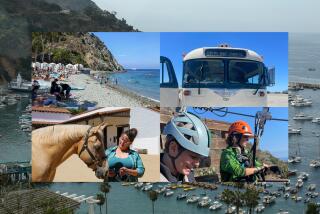Catalina Voyage: Critics Amused by a Misplaced Strudel
- Share via
A trip to Catalina by boat can be more perilous than one supposes.
I made the crossing recently on a stormy day, and although the voyage was rough and exciting, and even dangerous, perhaps, I thought I had made it over and back without mishap.
It wasn’t until I wrote an account of the day that I realized how disastrous my voyage had been.
The Catalina Express was scheduled to sail at 9 a.m., but when I arrived at the San Pedro terminal, its departure was still uncertain. I waited at the snack bar. Later I wrote as follows:
“I fortified myself while waiting with a blueberry strudel.”
Now that piece of obviously bad syntax provided several readers with much amusement and sport. Dixon Gayer, an English teacher with whom I have often corresponded, said that it reminded him of my previous classic line about “a man chasing a cat with a broom in his underwear.”
“As I understand the sentence,” he says, “you and a blueberry strudel were waiting together to board the Catalina Express, but despite the early morning hour, to ease the tension of waiting, you and the blueberry strudel went into a nearby bar and you fortified yourself with a bourbon on the rocks. You don’t say whether the blueberry strudel fortified itself or not.”
Gayer also takes the opportunity to comment on the working habits of newspapermen: “To be fair, you do not say that it was a bourbon on the rocks, but that’s what I expect a longtime reporter to use for fortification; certainly I have witnessed it many times and may even have imbibed a few myself when the gin ran low.”
Anne Berkovitz of the KCRW radio staff, a very saucy lot, evidently, writes that she pointed out my line to a few of them with the following results:
“What’s her telephone number?”
“I presume that’s Ms. Blueberry Strudel.”
“That was no strudel, that was my tart.” Berkovitz identified this as the contribution of Sarah Spitz, KCRW’s publicity director, and gave it first prize.
Berkovitz compared my line with the classic “Wanted: Piano by lady with four wooden legs.”
Oddly, Gayer did not perceive that the blueberry strudel was a tart I had picked up at the snack bar. He called her an it.
On a less provocative point, Tom Wert of San Clemente argues that I misused the word motors in the sentence “The captain told us it would be a rough ride . . . the motors roared and we surged out.”
“While a quick check of Webster’s New World Dictionary reveals a certain ambiguity as to the precise meaning of motor and engine,” Wert says, “engines are powered by combustible fuel. Motors use electricity to produce mechanical energy. . . . Boats and automobiles are powered by engines, not motors.”
Then why do we call them motorboats? Why are some ships called motor ships? Why are automobiles called motorcars? Why does the Department of Motor Vehicles call itself that?
Mr. Wert may be technically correct, but usage is against him. Besides, Webster’s New World defines motor as “an engine, especially an internal-combustion engine for propelling a vehicle. . . .”
I think Ms. Blueberry Strudel and I can retire to the bar and toast ourselves on that one.
I was obviously incorrect, though, when I wrote of my first sight of the emerging island: “Landfall. It is still a thrill, even on a short voyage. I thought I knew how the watch felt on the Santa Maria nearly 500 years ago.”
“Incorrect,” writes Pat Cologne, chairman of the State Historical Resources Commission and the Governor’s Commission for the Quincentenary (of Columbus’ discovery). “The watch was on the Pinta. His name was Rodrigo de Triana and he shouted out the discovery in the early morning hours of Oct. 12, 1492.
“The Pinta was the fastest of the three ships in Columbus’ fleet, and she was always moving ahead--often out of sight--much to the annoyance of Columbus. Later, Columbus announced his discovery from the Santa Maria.”
I certainly can’t quarrel with anyone as uniquely qualified to elucidate the point as Cologne. It was my recollection (from school days) that a freak wind had blown the Santa Maria ahead of the Pinta that fateful morning and that the Santa Maria’s watch had been the first to sight land. (As I remember, his name was Joe Lamborghini). His thrilling message, of course is well known: “Land ho! We have discovered Amerigo!”
“Thanks, anyway,” she says, “for calling attention to the upcoming Columbus Quincentenary (a terrible word) in 1992.”
A terrible word indeed. I bet that if the commissioners fortified themselves with blueberry strudel, they could think up something better.
More to Read
Sign up for The Wild
We’ll help you find the best places to hike, bike and run, as well as the perfect silent spots for meditation and yoga.
You may occasionally receive promotional content from the Los Angeles Times.






